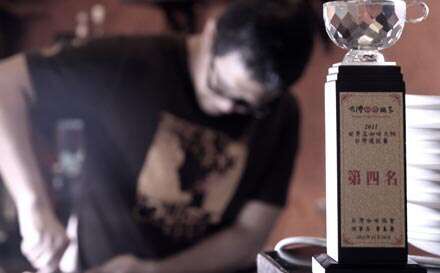Why can't Chinese tea companies compete with Starbucks, which sells coffee?
When it comes to selling coffee, you can immediately think of a long list of names: Starbucks, Nestle Coffee, Maxwell. However, when it comes to selling tea, I'm afraid not many people can name a few tea merchants. Chinese tea is famous all over the world, but the Chinese tea industry is always unknown. There is an empty market of hundreds of billions of dollars, but Chinese tea enterprises, not to mention going abroad and going to the world, are not easy to land on the main board, so they can only go back and turn to the new third board.
There are no fewer tea drinkers than coffee drinkers. Why can't Chinese tea companies come from such big companies as Starbucks?
A few days ago, following Xie Yuda, Tea Qiankun, and Ya'an Tea Factory, Huangshan six hundred miles Monkey Kui Tea Co., Ltd. also formally submitted a new third board listing application. From its public share transfer prospectus, we seem to be able to find a clue.
Six hundred miles Monkey Kui Tea Industry was founded in 2000 by the fourth generation of Taiping Houkui Tea founder, mainly engaged in Taiping Houkui Tea's cultivation, processing and sales. As a famous tea in Chinese history, Taiping Houkui Tea is famous both at home and abroad and has become a state-level diplomatic gift for many times. During the "Russia-China year" in 2007, General Secretary Hu Jintao presented "six hundred li" Taiping Houkui Tea as a "national gift" to Russian President Vladimir Putin.
According to the announcement, the operating income of Liu Baili shares from January to July 2015, 2014 and 2013 was 12.5294 million yuan, 21.0042 million yuan and 23.6005 million yuan respectively, and the net profit was 490600 yuan, 1.3589 million yuan and 1,6484 million yuan respectively.
The performance seems to be good, but it can also be seen from the financial report: "from January to July 2015, 2014 and 2013, the government subsidy income received by the company was 1.5373 million yuan, 1.3067 million yuan and 1.6485 million yuan respectively. The proportion of the total profits in the current period is 202.54%, 63.17% and 73.28%, which has a great impact on the total profits of the company."


In other words, after deducting government subsidies, the Haokui tea industry has lost money or made a small profit. Even three years of profits are heavily dependent on government subsidies, if the company can not continue to receive government subsidies in the future, the company may even fall into losses. Moreover, as part of traditional agriculture, the tea industry may not continue to receive government subsidies in the future. The company also mentioned this point in the risk tip: these government subsidies are mainly project support, followed by exhibition subsidies and tax incentives, if the company can not continue to receive corresponding government subsidies in the future, it will affect the company's profits.
We also found that tea companies are not alone in relying on government subsidies. Other tea companies listed on the new third board also have this problem more or less.
The data in the above figure are all derived from the public annual reports of each company.
The financial report data of the tea enterprises listed on the new third board show that their profits in recent years have been dependent on government subsidy income to varying degrees. Among them, Tea Qiankun and Black Beauty mostly accounted for more than 50% of the net profit in the past three years (only Black Beauty accounted for 18% in the first half of 2015). In addition, the net profits of tea enterprises have also fluctuated greatly in the past three years, with some companies deducting government subsidies and even showing large losses in some years.
Any successful business model needs to rely on self-business to support itself. If you rely on financing and subsidies to make a profit, it is not a sustainable development model. It is worth paying attention to whether the Monkey Kui Tea Industry, once a "national gift", can take advantage of the opportunity of landing on the new third board to become bigger and stronger, change the current situation that profits depend on government subsidies, and make a Starbucks of China's tea industry.
Source: interface
Important Notice :
前街咖啡 FrontStreet Coffee has moved to new addredd:
FrontStreet Coffee Address: 315,Donghua East Road,GuangZhou
Tel:020 38364473
- Prev

Louisa LOUISA takes care of the coffee we make and makes every guest happy.
Louisa Brand Story 01 Origins Louisa Coffee The origin of LOUISA COFFEE began long before the first store was founded. In 2003, if you want to drink a cup of good coffee, you have to spend at least a hundred yuan to drink it in the most professional coffee shop! However, in Europe and America, good coffee is not only available, but also affordable, coffee culture is deeply rooted. Coffee lovers at the time
- Next

Classic cafes all over the world-must-see places for travel
Cafes have been places full of literary thoughts for centuries, when the best people in the world lingered and talked in these places. Freud, Goethe, Byron, Einstein, Trotsky, Tagore are intoxicated coffee corner day and night, encounter those great minds who write history in fantasy! Egypt | Cafe Fesavi, Cairo (El Fishawy Coffee Sh
Related
- What brand of black coffee is the most authentic and delicious? what are the characteristics of the flavor of the authentic Rose Summer Black Coffee?
- Introduction to the principle and characteristics of the correct use of mocha pot A detailed course of mocha pot brewing coffee is described in five steps.
- Which is better, decaf or regular coffee? how is decaf made?
- How much is a bag of four cat coffee?
- How about four Cat Coffee or Nestle Coffee? why is it a cheap scam?
- Which is better, Yunnan four Cats Coffee or Nestle Coffee? How about cat coffee? is it a fake scam? why is it so cheap?
- How about Cat Coffee? what grade is a hoax? which instant coffee tastes better, four Cat Coffee, Nestle Coffee or G7 coffee?
- Process flow chart of coffee making-Starbucks coffee making process what coffee tastes good at Starbucks
- The top ten best coffee beans in the world Rose summer coffee or Tanzanian coffee tastes good
- Yunnan four cat coffee is good to drink?_four cat coffee is a big brand? four cat blue mountain coffee is fake?

